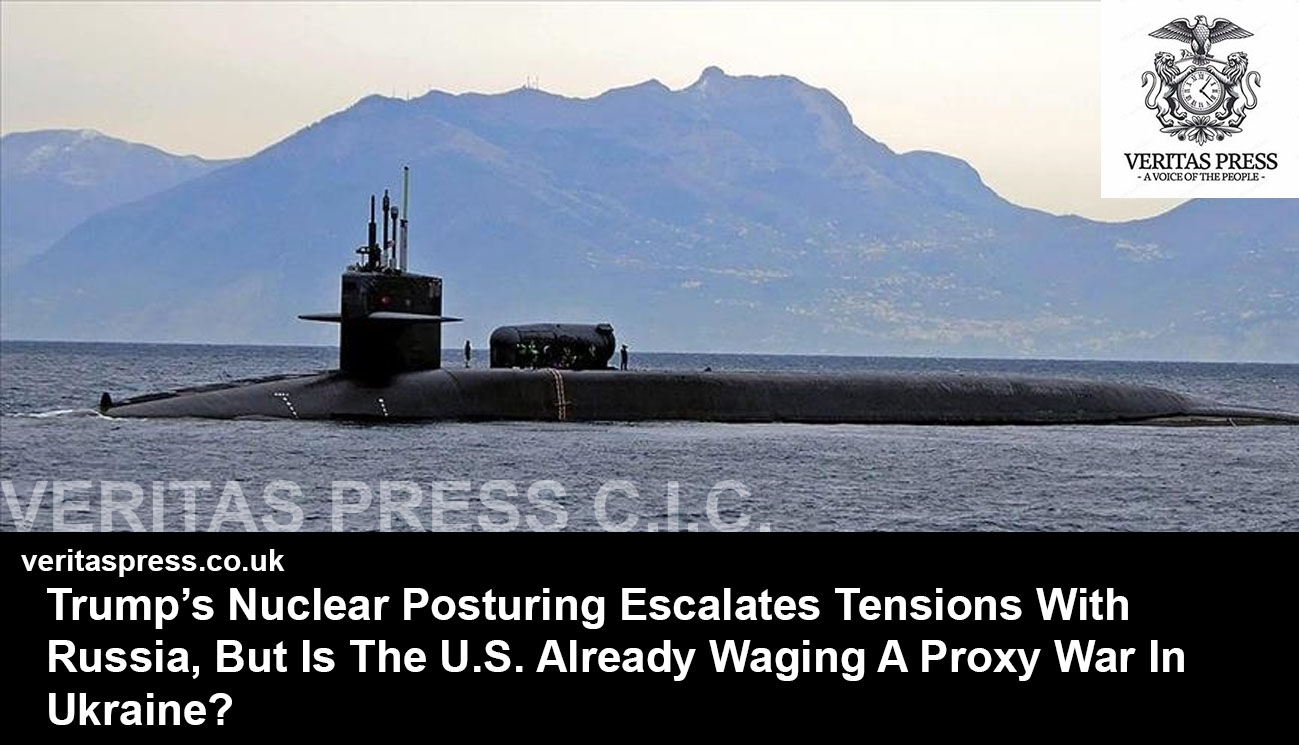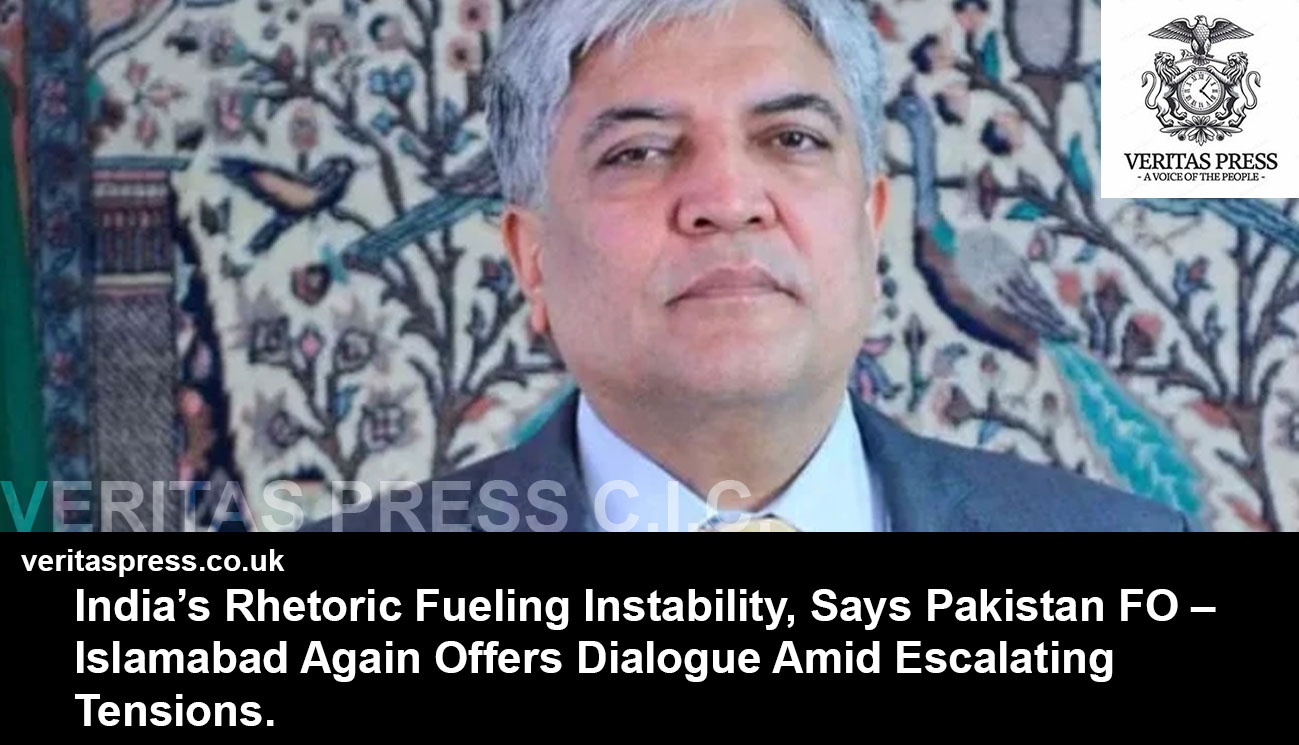Press Release: Veritas Press C.I.C.
Author: Kamran Faqir
Article Date Published: 02 Aug 2025 at 11:22 GMT
Category: US | Politics | Trumps Proxy Wars
Source(s): Veritas Press C.I.C. | Multi News Agencies
Analysts warn of performative brinkmanship and militarised diplomacy as Washington’s nuclear messaging edges the world closer to catastrophe.
WASHINGTON — President Donald Trump’s dramatic announcement Friday that he has ordered the deployment of two nuclear submarines to “the appropriate regions” in response to a menacing social media post from former Russian President Dmitry Medvedev has drawn swift international concern, with analysts and diplomats warning that the move dangerously blurs the line between diplomatic deterrence and nuclear brinkmanship.
The escalation follows a week of inflammatory rhetoric between Trump and Medvedev, now the deputy chair of Russia’s Security Council, as the two traded increasingly hostile messages referencing nuclear capabilities, Cold War-era doomsday systems, and doomsday film franchises. But beneath the theatrics, experts and critics say Trump’s stunt reveals a deeper, more troubling truth: the United States is already waging a proxy war against Russia in Ukraine, and this latest display of nuclear posturing risks dragging the world even closer to direct conflict.
“The U.S. has been fuelling this war for years by arming Ukraine, pouring billions into military aid, and expanding NATO infrastructure closer to Russia’s borders,” said Katrina vanden Heuvel, longtime Russia analyst and publisher of The Nation. “Now we’re being told that nuclear submarines are needed for ‘protection’? That’s not defence, that’s provocation.”
From Ultimatums To Underwater Arsenal:
Trump’s announcement, made on Truth Social, cited “highly provocative statements” by Medvedev, who warned earlier this week that Trump’s new Ukraine ultimatum, now shortened to 10 or 12 days, risked triggering war “not between Russia and Ukraine, but with his own country.” In a subsequent Telegram post, Medvedev ominously referenced the “Dead Hand” nuclear system, a Soviet-era automated launch system designed to retaliate if leadership is incapacitated.
Rather than de-escalate, Trump leaned in.
“I have ordered two Nuclear Submarines to be positioned in the appropriate regions, just in case these foolish and inflammatory statements are more than just that,” Trump wrote, later adding, “Words are very important, and can often lead to unintended consequences.”
But many critics argue that it is Trump’s own words and actions that have inflamed the situation.
“Deploying strategic nuclear platforms in response to trolling on Telegram is not a strategy, it’s recklessness,” said Joe Cirincione, former president of the Ploughshares Fund. “This is how great powers stumble into catastrophic war.”
Indeed, Pentagon officials, speaking to Politico on background, admitted there was “no direct military threat assessment that prompted the move,” suggesting the submarines were already on routine patrols. The announcement, then, appears more symbolic than tactical, weaponised messaging wrapped in military hardware.
“This is performative nuclear signalling for a domestic audience,” said Dr. Ankit Panda, senior fellow at the Carnegie Endowment for International Peace. “But that doesn’t make it less dangerous.”
A Proxy War By Any Other Name:
While Trump claims to be pushing for peace in Ukraine, blaming President Biden for allowing the war to escalate, his administration has continued the very policies that critics say have prolonged the war: mass arms shipments, intelligence sharing with Kyiv, and increasingly aggressive NATO posturing near Russia’s western flank.
Since February 2022, the U.S. has committed over $180 billion in military and financial support to Ukraine, according to the Congressional Research Service, including the transfer of long-range missiles, F-16 fighter jets, and artillery systems capable of striking deep into Russian-held territory.
“Let’s be clear: this is a U.S.-sponsored proxy war,” said Medea Benjamin, co-founder of anti-war group CODEPINK. “The people of Ukraine are dying so U.S. defence contractors can profit and American politicians can play power games against Russia.”
Benjamin added that Trump’s claim to want peace is undercut by his continued military support for Kyiv and escalatory threats toward Moscow.
“You don’t end a war by threatening nuclear annihilation on social media,” she said.
Indeed, the Stockholm International Peace Research Institute (SIPRI) has warned that the growing militarisation of the Russia-Ukraine conflict, backed by U.S. funding and NATO expansion, risks turning a regional war into a global conflagration.
“The deployment of U.S. nuclear submarines sends the wrong signal at the wrong time,” said Dan Smith, SIPRI Director. “It reinforces a zero-sum, Cold War mentality that makes diplomacy nearly impossible.”
The Dead Hand And The Death Of Diplomacy:
Medvedev’s reference to the “Dead Hand” system, a Cold War relic rumoured to be still operational, struck a nerve in Washington, not because it signals an imminent threat, but because it evokes the spectre of an uncontrolled, catastrophic chain reaction. In effect, both Trump and Medvedev are playing nuclear chicken.
“The danger here isn’t just the weapons, it’s the rhetoric,” warned Dr. Fiona Hill, former Russia adviser on Trump’s National Security Council. “When nuclear-armed leaders use apocalyptic imagery and personal insults as a form of diplomacy, they make catastrophic miscalculation more likely.”
Yet Trump has leaned into these theatrics, portraying himself as the only leader capable of “controlling Putin” while ridiculing Ukrainian President Volodymyr Zelenskyy as a “mini dictator” in recent remarks.
Meanwhile, Putin, who has not directly responded to Trump’s latest threat, told reporters Friday that Russia seeks a “lasting and stable peace” but reiterated that such peace must be on terms acceptable to Moscow. Talks in Istanbul last week broke down in under an hour, and no new diplomatic initiatives are on the table.
“We are witnessing a collapse of diplomacy on all sides,” said Richard Sakwa, professor of Russian and European politics at the University of Kent. “Trump’s submarine threat does not deter Russia; it confirms to the Kremlin that Washington has no interest in negotiation.”
NATO Expansion And Escalation Creep:
Trump’s escalatory language also coincides with renewed U.S. military activity in Eastern Europe. According to Defence News, a new forward-deployed NATO command is being established in Romania, and U.S. forces have increased intelligence and drone operations in the Black Sea.
“The U.S. military presence in the region is at its highest levels since the Cold War,” said William Hartung, a senior research fellow at the Quincy Institute for Responsible Statecraft. “Whether Trump admits it or not, these moves entrench the U.S. deeper into a war that it claims to be trying to end.”
In Moscow, state media outlets like RT and Sputnik have seized on Trump’s comments to stoke nationalist fears, portraying the submarine deployment as proof that the U.S. intends to “escalate toward nuclear confrontation.”
“Washington has lost the ability to distinguish between message and threat,” declared a commentary in Izvestia, a Russian state-aligned newspaper. “It speaks the language of war even while pretending to seek peace.”
A Nuclearised Social Media Spiral:
Ultimately, the Trump-Medvedev standoff is more about spectacle than substance. However, that spectacle is unfolding on a global stage, with nuclear implications.
“When world leaders treat nuclear posturing like a Twitter feud, we all lose,” said Beatrice Fihn, former director of the Nobel Peace Prize-winning International Campaign to Abolish Nuclear Weapons (ICAN). “The sheer irresponsibility of this moment should terrify everyone.”
Meanwhile, the Biden administration, still active in many multilateral diplomatic initiatives, has yet to formally respond to Trump’s actions or Medvedev’s threats, opting instead to maintain “strategic ambiguity,” according to a State Department official speaking on condition of anonymity.
But with nuclear submarines now being moved as props in a political theatre of one-upmanship, ambiguity may no longer be enough.
“Trump isn’t just posturing, he’s playing with the architecture of global security,” warned Dr. Jeffrey Lewis, a nuclear expert at the Middlebury Institute of International Studies. “This isn’t diplomacy. This is a live wire, and someone’s going to get shocked.”
In Summary: A Nuclear Game Without Rules.
Donald Trump’s decision to publicise the deployment of U.S. nuclear submarines in response to inflammatory rhetoric from Dmitry Medvedev is not just reckless; it is a dangerous symptom of a broken global security order increasingly driven by egos, not strategy. This is not diplomacy. This is nuclear signalling conducted over social media, weaponising instability for political theatre.
At its core, the unfolding crisis reflects the deeper reality that the United States is already entangled in a protracted proxy war against Russia, one it helped inflame by flooding Ukraine with weapons, pouring tens of billions into military assistance, and expanding its military footprint along Russia’s borders. Far from acting as a neutral peace-broker, the U.S. has deepened the conflict while claiming to de-escalate it.
“We’re watching a superpower drift into nuclear brinkmanship not through carefully calibrated policy, but through impulsive messaging and performative threats,” said Dr. Tara McCormack, a foreign policy expert at the University of Leicester. “This is how wars begin, not with planning, but with political bluster and a refusal to back down.”
The risk here is not merely about miscalculation between nuclear powers. It’s about normalising the public use of nuclear threats as a casual extension of political rivalry. It’s about turning weapons of mass destruction into talking points. When both sides invoke doomsday systems like “Dead Hand” and the invincibility of nuclear submarines, the deterrence logic of the Cold War era unravels and with it, the fragile equilibrium that kept catastrophe at bay for decades.
There is no strategic calculus that justifies this escalation, only a cynical political one. Trump, increasingly boxed in by stalled diplomacy and a war he promised to end, now reverts to hard-power theatrics. Medvedev, sidelined within the Kremlin but eager to prove his relevance, responds in kind. And in the middle, the people of Ukraine continue to die in a war that neither Washington nor Moscow appears truly committed to ending.
As Daniel Ellsberg, the late Pentagon whistleblower, once warned, “The most dangerous lie is that the nuclear status quo is stable, that it is safe, that it is normal.”
Today, that lie is being laid bare in real time.
The United States cannot afford to continue sleepwalking into a wider war under the pretence of deterrence while stoking the very fires it claims to extinguish. If this moment proves anything, it is that the militarised rhetoric, nuclear brinkmanship, and unchecked proxy warfare of today are not just irresponsible, they are unsustainable, undemocratic, and ultimately, unforgivable. Unless diplomacy is urgently reclaimed from the hands of war hawks and political opportunists, the question may no longer be whether the next war is fought, but whether it ends the world altogether.
Tags:




























Leave a Reply